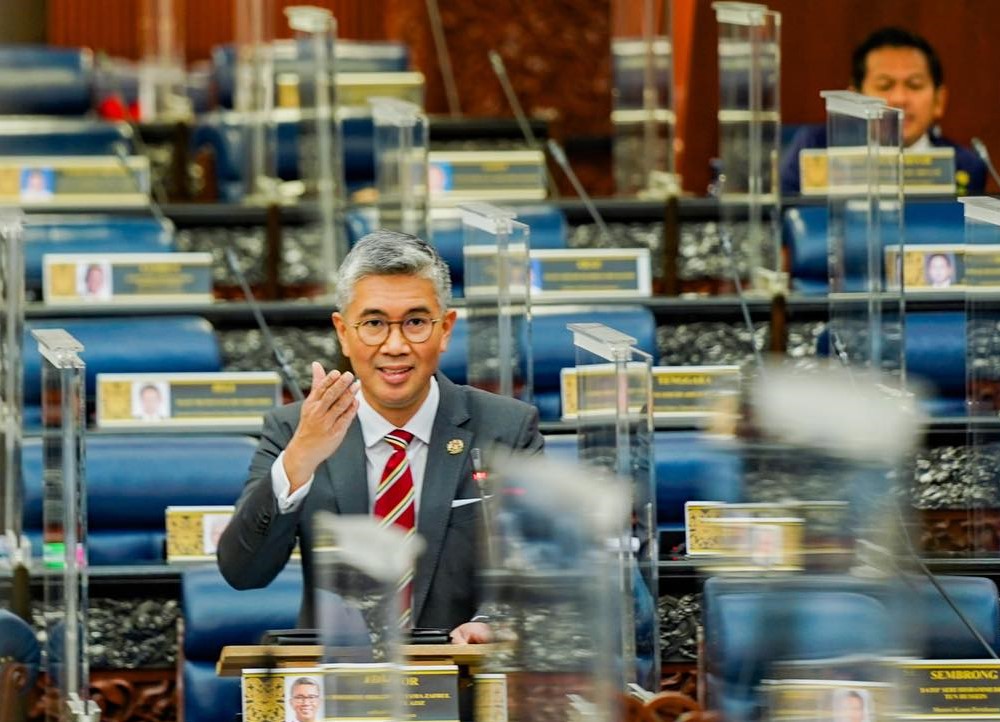KUALA LUMPUR, Dec 10 – The government might be forced to fund Covid-19 boosters from Budget 2023 that would likely only be tabled late next year after the revocation of emergency legislation cut off access to the National Trust Fund (KWAN), even as third vaccine doses may be needed urgently to curb the Omicron variant.
Finance Minister Tengku Zafrul Aziz told Parliament’s Public Accounts Committee (PAC) in a meeting on July 28 that the government has used RM1.027 billion of the RM5 billion it intended to take out from KWAN to procure coronavirus vaccines. However, no KWAN funds were used after all ordinances under the Emergency Proclamation were revoked effective July 21.
“We are still waiting on the details from the Ministry of Health (MOH) and the Ministry of Science, Technology and Innovation (MOSTI) on this buffer stock. I think it’s inevitable that we need to proceed with this. But in terms of allocation, we have not yet made an allocation.
“As presented by the Finance Ministry’s secretary-general earlier, we have allocated 130 per cent. So, with that 30 per cent extra, we can use that first for the time being in terms of our buffer stock. But in Budget 2023, we will definitely have to take this into account,” Tengku Zafrul said, according to transcripts of the meeting published in PAC’s Covid-19 Vaccine Procurement report.
Tengku Zafrul confirmed that the government was allowed to access KWAN funds under an emergency ordinance, when asked by PAC member and Pasir Mas MP Ahmad Fadhli Shaari.
To a subsequent question asked by Kluang MP Wong Shu Qi, who is also a member of the PAC, on whether the government continued to take out funds from KWAN after July 21 when emergency ordinances ceased effect, Finance Ministry budget director Johan Mahmood Merican said: “We have not used any KWAN funds after July 21 until now.”
When asked further by PAC chairman Wong Kah Woh if MOF “will issue more money” from KWAN after July 21, Johan said: “Based on the position now where the emergency ordinances have been revoked, we are not able to spend any money from KWAN.”
On April 21, the government amended the National Trust Fund Act 1988 to permit the usage of KWAN — the country’s natural resource fund with national oil corporation Petronas as the sole contributor — to procure Covid-19 vaccines and related purposes through the Emergency (National Trust Fund) Ordinance (Amendment) 2021.
The government initially estimated it would need RM2.3 billion to vaccinate 80 per cent of Malaysia’s population. However, it was later announced under the Permai aid package in January that more funds were needed to purchase an additional 40 per cent buffer stock that would allow the government to vaccinate 120 per cent of the population, or 38 million people.
Later in June, It was announced under the Pemulih package that the government would procure enough vaccines to cover 130 per cent of the population that included an additional purchase of 12.8 million Pfizer-BioNTech vaccine doses for adolescents aged 12 to 18.
In total, the government estimated it would need RM5.8 billion for two things: to procure Covid-19 vaccines (RM3.9 billion) and to run the National Covid-19 Immunisation Programme (RM1.9 billion). The latter includes payment for vaccination centre (PPV) rentals and volunteer allowances.
Treasury secretary-general Asri Hamidon confirmed with the PAC that RM5 billion would be funded by KWAN, while the remaining RM800 million will come from the Covid-19 Fund, which was gazetted in October 2020 and has an overall ceiling of RM65 billion.
With access to KWAN funds now restricted, Tengku Zafrul said the government “will manage the cash flow internally”.
The finance minister told RTM in September that the government will raise the ceiling cap for the Covid-19 Fund from RM65 billion to RM110 billion to “support people and businesses” as the economy reopens. Two Bills to increase spending under the Covid-19 Fund and to raise the statutory debt limit from 60 per cent to 65 per cent of gross domestic product (GDP) were tabled in Parliament last month.
The amount of money the government has committed for Covid-19 vaccine purchases hit RM4.1 billion as of July 23, according to PAC’s report. This is above the RM3.9 billion self-imposed ceiling that the government had initially set.
Then Science, Technology and Innovation Minister Khairy Jamaluddin attributed the higher costs to a mix of delivery delays and increased demand for vaccines to facilitate Klang Valley’s Operation Surge Capacity to curb a surging epidemic that nearly overwhelmed the region’s health care facilities.
The government procured a total of 87.9 million Covid-19 vaccine doses as of September 13, consisting of 44.8 million Pfizer doses, 6.4 million AstraZeneca doses via direct purchase, another 6.4 million AstraZeneca doses from the COVAX facility, 20.4 million Sinovac doses, 3.5 million CanSino doses, and 6.4 million Sputnik V doses.
The 87.9 million coronavirus vaccine doses were procured for RM4.64 billion, including the cost of logistics of distribution.
The government is pushing for uptake of Covid-19 vaccine boosters, with Pfizer named as the recommended main booster to primary vaccination for all vaccine types, while AstraZeneca-Oxford’s shot is an alternative. As of December 7, only 13.5 per cent of adults in Malaysia have been boosted.
The need for a booster dose is further emphasised in light of the Omicron variant, with a South African study showing a 41-fold drop in Pfizer’s neutralisation of Omicron compared to the ancestral D614G virus. Considerable protection, however, is retained in people who were both double vaccinated with Pfizer and previously infected.
Meanwhile, Pfizer’s preliminary study showed that three doses of its Covid-19 vaccine are likely to protect against the Omicron variant that is feared to be more transmissible than Delta, while two shots may still be able to prevent severe disease.








